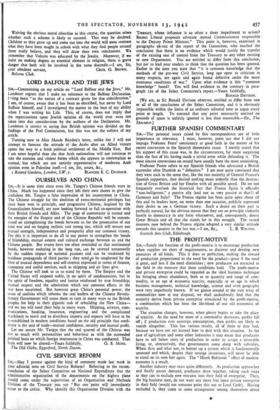CIVIL SERVICE REFORM SIR, —May I protest against the kind of
comment made last week in Your editorial note on Civil Service Reform? Referring to the recom- mendation of the Select Committee on National Expenditure that the administrative organisation of the departments on the highest plane should come under the supervision of an Organisation and Methods Division of the Treasury you say " But one point will immediately occur to the critics. Why identify this Organisation Division with the Treasury, whose influence is so often a sheer impediment to action? Recent Liberal proposals advocate instead Commissioners responsible to the Deputy Prime Minister." This point is, however, examined in paragraphs 98-102 of the report of the Committee, who reached the conclusion that there is no evidence which would justify the transfer of the existing seat of control from the Treasury to any other existing or new Department. You are entitled to differ from this conclusion, but not to lead your readers to think that the question has been ignored. Earlier in the note you state that " it is common knowledge that the methods of the pre-war Civil Service, long ago open to criticism in many respects, are again and again found defective under the more strenuous conditions of war." Upon what evidence is this "common knowledge " based? You will find evidence to. the contrary in para- graph 120 of the Select Committee's report.—Yours faithfully, RONALD DAVISON.
[We are, as Sir Ronald Davison observes, entitled to differ from one or all of the conclusions of the Select Committee, and it is obviously impossible within the limits of an ordinary editorial note to argue every point at length. To contend that any point necessarily omitted on grounds of space is unfairly ignored is less than reasonable.—ED., The Spectator.]


























 Previous page
Previous page